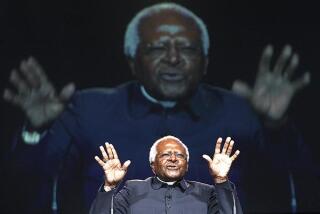A Bloody Era of Terror Was Also on Trial : South Africa: Neither blacks nor whites can escape blame for the violent times--including Winnie Mandela. But she also endured crushing burdens because of who she is.
- Share via
The six-year prison term meted out to Winnie Mandela in Johannesburg will be debated at length, including during the appeal.
One thing stands out. Her controversial actions were taken during a time when terror--official and unofficial--stalked the land. That era was on trial with her.
The sensational trial was a symptomatic reminder of the bad days of apartheid and repression.
Under embittered former President P. W. Botha, who led South Africa during its most repressive era of white rule, there were military death squads that systematically wiped out political dissidents. There were thousands of detentions and deaths. There were marathon political trials. There was repression of the press. There was the most thoroughgoing state of emergency that the country had known--in peace or war. There was destabilization ofneighboring countries that cost thousands of lives and millions of dollars.
Few in the white community can be proud of the cold-blooded killing of liberal and radical dissidents, the imprisoning of blacks for non-offenses such as sporting a political T-shirt, the use of police dogs on blacks swimming at “white” beaches and the judicial tolerance of whites who treated blacks as subhumans.
Nor can many in the black community be proud of the public “necklacing” of suspected black informers with gasoline-doused tires, the anti-white excesses of some black activists yelling, among other things: “One settler, one bullet,” and the sacrificing of a whole generation of young blacks, who lost their education, innocence and youth to extreme militancy.
Those were the bad days, the apartheid days, when Winnie Mandela committed her offenses.
Few emerged from that era with honor. Ordinary folk cannot escape blame; whites for not doing more to rid the country of apartheid; blacks for not curbing extremists who turned entire communities into accessories to random murder and mayhem.
Winnie Mandela, because her husband Nelson was in prison “for life,” endured crushing burdens that would have defeated ordinary people.
Because she was at the epicenter of racial turmoil, Winnie Mandela was harassed to the breaking-point by security forces, who followed her, abused her, spied on her and made her life an embattled misery. She had to be protected, as the judge who sentenced her to prison noted in a perceptive remark.
The country was at war with the world and with itself. Nelson Mandela, a towering, dignified presence, was locked up, unable to protect his wife from official harassment--or from her own folly in those dark days of December, 1988.
Now she has been given a six-year sentence, a long time for her at 56 but a lifetime for him at 72. If she sits it out, she will become a rallying-point for black dissent the likes of which have not been seen before. Extremism and division will be fueled. The negotiation process between the government and Mandela’s African National Congress will be impaired.
Winnie Mandela has been found guilty of ordering that children refugees from township terror be carried off to her home (ostensibly because they were being sexually abused at a Methodist church). That is kidnaping. She has also been found guilty of being an accessory to assault.
In this Greek tragedy, all South Africans stand accused. The society that produced Winnie Mandela was a very sick one.
There are signs that, awful violence in the black community notwithstanding, the country is edging toward nonracial democracy. The government of Frederik W. de Klerk has disowned apartheid. And the day his wife was being sentenced, Nelson Mandela was speaking reassuringly in Afrikaans (known to many as the language of the white oppressor) to a group of white students at Stellenbosch, near Cape Town. There is hope.
The courts, in the appeal process, will have to decide what to do with Winnie Mandela. But the 40 million South Africans--the white minority and the black majority--will have to rise above an awful past and live like normal human beings, or else perish in racial chaos.
More to Read
Sign up for Essential California
The most important California stories and recommendations in your inbox every morning.
You may occasionally receive promotional content from the Los Angeles Times.










